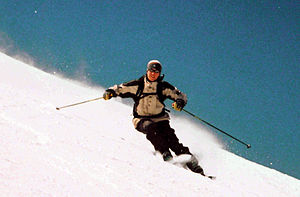 Here’s a typical intermediate joint strength and muscle flexibility situation that happens to us all.
Here’s a typical intermediate joint strength and muscle flexibility situation that happens to us all.
Alex was fortunate enough to retire at 50 and he immediately took up skiing as his “fun activity”. Alex was a little overweight and somewhat out of shape. But Alex was a big, healthy man whose medical checkups were positive and his doctor gave him a green light for skiing.
After only two seasons of skiing Alex injured his right knee. The doctor said it was only a mild case of tendonitis, a repetitive strain injury, and told him to treat it with ice and ibuprofen. Alex continued to ski and guess what? Because he favored one knee he injured the other and then his back.
Now Alex was out for the remainder of the season. His “minor” injury over time turned into a more serious and debilitating one.
Alex didn’t understand the need to cross-train his muscles. Like so many other seasonal or weekend warriors, Alex believed his body was strong enough to adapt to almost anything. Unfortunately his body broke down, joint-by-joint.
Muscle and connective tissue injuries include sprains and strains, which are the most common injuries for people engaged in physical sports. A sprain is an injury of a ligament, which connects our bones to each other. A strain is an injury that can occur to a muscle or a tendon, which connects our bones to our muscles. Alex had a tendon or connective tissue injury, and he experience pain, swelling, and limited movement of his knee. Sometimes these injuries are evident as soon as they occur, while others, like Alex’s, take time to develop. Usually rest helps to heal the area, and ice can reduce swelling, but these are merely temporary fixes.
To better prevent stress or repetitive movement injuries it is always recommended to cross-train your muscles. Weight or resistance training, yoga and Pilate’s can help prevent injuries from happening. When Alex wasn’t in his skiing season he did nothing to train, strengthen his muscles or prevent future injury.
Priming your muscles before the snow even falls will prep you for skiing’s intense quad and hamstring workout. Plus, cardio is important because it’ll help your body adjust to the mountain altitude. Alex was a sea level dweller and mountain warrior who would head up to the ski resorts come winter. If you work out year round, you will already have a good base for your cardiovascular fitness to help curb altitude’s side effects and more importantly avoid incapacitating muscle and joint injuries.

Recent Comments